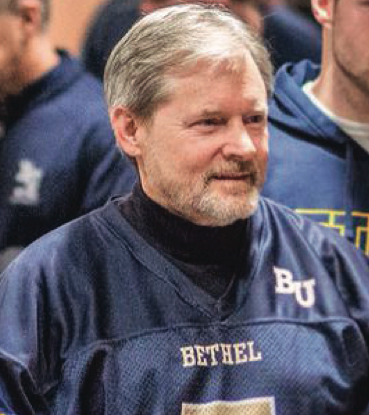President Barnes and Bethel faculty cite Scripture to weigh in on hiring homosexual, non-celibate staff.
Marissa Gamache | News Editor
The Council for Christian Colleges and Universities (CCCU) consists of 400,000 + students enrolled in 180 colleges and universities across the world. Founded in 1976, the CCCU’s mission is “to advance the cause of Christ-centered higher education and to help our institutions transform lives by faithfully relating scholarship and service to biblical truth.” Along with 35 protestant denominations, and the Catholic Church make up the council.

Issues arose for the CCCU on June 26, 2015 when the Supreme Court of the United States ruled that same-sex marriage is to be legal in all 50 states. Historically, the CCCU has held traditional views on marriage as the union between one man and one woman; a standard they hold for each member institution. By mid-July, two schools in the council, Eastern Mennonite University (EMU) and Goshen College announced their plan to open faculty and staff positions to homosexual, non-celibate peoples. Their decision was a clear contradiction to the long standing beliefs of the CCCU. One week after their announcement, the CCCU held their bi-annual meeting where they opened dialogue on the topic and enlisted the recommendation of each member’s president in dealing with the issue.
Bethel’s President Jay Barnes released a joint statement with Converge Ministries addressing the recent discussions in the CCCU. “Regardless of the decision of the CCCU,” the statement read, “we felt it necessary to reiterate our commitment to the centrality of the Bible in all arenas of life. Bethel University will continue to hold to the clear teachings of Scripture that marriage is between one man and one woman.” Also later saying, “We think that EMU and Goshen College have made a decision inconsistent with the teaching of Scripture.” They stressed the importance of holding to the biblical view of marriage and that to disregard what the Bible says on marriage would threaten the unity and mission of the CCCU.
Dr. Joel Frederickson, Professor and Psychology Department Associate Dean of Institutional Assessment and Accreditation at Bethel, raised the question of what the definition of biblical marriage is.
“Some biblical ideas on marriage are not even legal now,” Frederickson said, citing occasions girls as young as 12 or 13 would be wed to much older men in the Bible. This practice, of course, is not commonplace nor legal in the western world.
On September 15, EMU and Goshen both withdrew their membership from the CCCU, laying to rest the immediate issue, but not before Union University and Oklahoma Wesleyan University withdrew, voicing their concern with the process which the issue was being handled. It is uncertain whether Bethel would have stayed on as a member had those schools remained in the CCCU.
History department professor and chair, Dr. Chris Gehrz pointed out that Bethel is still a member of the Lilly National Network of Church-Related Colleges and Universities, “even though its membership still includes Goshen and Eastern Mennonite, plus Catholic, Lutheran, and other schools that have been hiring openly gay faculty and extending benefits to their spouses for a while now,” Gehrz said.
Frederickson voiced his hope that even if the CCCU moves to allow members to hire homosexual, non-celibate staff and faculty, that Bethel would continue with the CCCU and would be disappointed if we left over this issue, and Gehrz agrees.
“The Bible teaches that the starting point of Christian witness is our unity as the Body of Christ. An already polarized, fractured, broken world watches Christians… and sees what? Unity, or division,” Gehrz asks.
There is another meeting set for January of 2016 where the CCCU will revisit this issue, with a plan to define what their stance further.




















